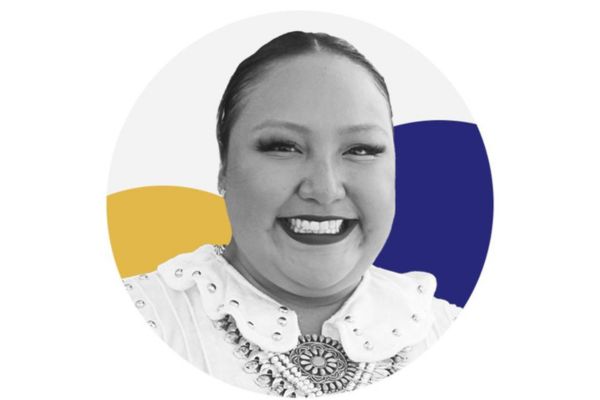
- Details
- By Kaili Berg
“It’s still pretty surreal to me that I was selected for this wonderful opportunity,” Haswood told Native News Online.
Launched in 2018, the Obama Foundation Leaders program gathers leaders from different regions of the world to share ideas and expand their leadership skills to create positive change in their communities. In addition to working with each other, the changemakers will engage with former president Barack Obama, leadership coaches, and experts in various fields.
Haswood said she is most excited to meet the other cohort members and young leaders across the country. She does not plan to be the state representative for District 10 (Lawrence) for the rest of her life and is excited to learn more with the resources of the Obama’s Foundation Leaders program to help grow.
“I’m really excited that the resources are here. The Obama Foundation’s values are really close to my values. And I just feel comfortable and welcome in this community,” Haswood said.
Haswood was elected to 2021-2022 Legislative session, and she is already making history. At 29 years old, she is currently the youngest member of the legislature and the third Native American member.
“About a month before graduating with my master’s, I got asked to run for office,” Haswood said. “And it took a couple of tries to convince me. But eventually, I threw my hat in the ring. It’s important to have Indigenous young people and young women in these spaces. When you’re native, your life is already political, whether you like it or not.”
Haswood was born and raised in Lawrence, Kansas, and earned a Bachelor’s degree in public health from Arizona State University in 2018. She graduated from the University of Kansas Medical Center with a Master’s in Public Health in 2020.
When Tribal issues arise, Haswood says she is limited in her reach across the 46 combined House and Senate committees, not including joint and special committees. Being on the younger side comes with some challenges, she added.
“I feel like my thoughts and ideas were not seen as serious in comparison to my older colleagues, and when I first ran for office, one of my opponents even slut shamed me in one of their attempts to paint me as not mature enough for the job,” Haswood said.
Haswood said she also faces microaggressions and racism from the public and even colleagues.
“In my time in the Kansas state legislature, I have seen Tribal legislation fight through stereotypes that if this piece of legislation is giving back their land, then, the bill has to say somewhere that they will not build a casino there,” Haswood said.
Despite the challenges, Haswood says she is inspired by her mother and father, who have sacrificed so much for her to be where she is today.
“My mom works in information technology, and I have seen her overcome a field that is predominately male and nondiverse, all while leading with kindness, compassion, and empathy,” said Haswood.
Haswood said during her first run for office, her team thought using TikTok would be a great way to produce content and educate people about voting in a fun way. A Kansas high schooler offered Haswood their expertise for video ideas, and it soon went viral. A video showing her Navajo culture and being a young woman in politics received over a million views.
Haswood said she originally started her Tiktok as an educational campaign tool, but when she is not campaigning, she uses her platform to bring the representation of being a Navajo Kansas woman in state politics.
“I use my humor to share my experiences being in the Kansas state legislature, and I enjoy filming in the Capitol to help normalize and break down barriers of civic engagement at the state level,” said Haswood.
Haaswood took a unique approach to her campaign and utilized social media. She wore traditional Navajo attire during her swearing-in ceremony, and TikTok videos of the ceremony went viral and received media coverage from BuzzFeed and Vogue.
“I hope I inspire others,” Haswood said. “I remember what it felt like to just look up at who represented me in Congress, state house, and at local levels. No one was Native or a young person. Hopefully that me being there can be that little bit of inspiration for people.”
More Stories Like This
Native News Weekly (August 25, 2024): D.C. BriefsUS Presidents in Their Own Words Concerning American Indians
NDAA passes House; Lumbee Fairness Act Advances
NFL, Vikings to Host Native All-American Game, Youth Flag Clinic
Senate Committee on Indian Affairs Passes 12 Bills to Strengthen Tribal Communities
Help us defend tribal sovereignty.
At Native News Online, our mission is rooted in telling the stories that strengthen sovereignty and uplift Indigenous voices — not just at year’s end, but every single day.
Because of your generosity last year, we were able to keep our reporters on the ground in tribal communities, at national gatherings and in the halls of Congress — covering the issues that matter most to Indian Country: sovereignty, culture, education, health and economic opportunity.
That support sustained us through a tough year in 2025. Now, as we look to the year ahead, we need your help right now to ensure warrior journalism remains strong — reporting that defends tribal sovereignty, amplifies Native truth, and holds power accountable.
 The stakes couldn't be higher. Your support keeps Native voices heard, Native stories told and Native sovereignty defended.
The stakes couldn't be higher. Your support keeps Native voices heard, Native stories told and Native sovereignty defended.
Stand with Warrior Journalism today.
Levi Rickert (Potawatomi), Editor & Publisher


